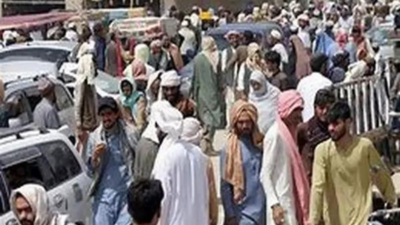
Representative image (Picture credit: ANI)
More than 200,000 Afghans have left Pakistan since April as Islamabad ramped up its deportation campaign targeting undocumented migrants, with Iran also increasing expulsions, raising concerns over Afghanistan’s capacity to manage the influx.According to Pakistan’s ministry of interior, over 135,000 Afghans left the country in April, followed by 67,000 in May, and more than 3,000 in just the first two days of June. The repatriation drive, which began in November 2023, has now seen over one million Afghans return from Pakistan, reported news agency ANI, citing ARY News.The deportation campaign is aimed at more than 800,000 Afghans whose residency documents have been revoked.
Among them are individuals born or raised in Pakistan. Islamabad has accused Afghan nationals of links to terrorism and blamed Kabul for harbouring militants, a charge the Taliban authorities have repeatedly denied.Farmer Mohammad Wali, who crossed into Afghanistan via the southern Spin Boldak border, was quoted by AFP as saying, “We left behind our orchards... but we said to ourselves, ‘If we stay, maybe one day we’ll lose our dignity.’”
With Eid al-Adha approaching, the pace of returns has slightly slowed, though crossings continue daily.Iran, meanwhile, is pushing ahead with similar measures. The UN's International Organisation for Migration (IOM) recorded 15,675 Afghan deportations from Iran in May, more than double the figure in April. The IOM expressed alarm at the increasing number of families, rather than single men, being sent back, calling this “a new and concerning trend.”In late May, Iranian authorities ordered undocumented Afghans to leave by July 6—a move that could impact as many as four million people, according to AFP. Already, more than 450,000 Afghans have returned from Iran since January.Both nations host millions of Afghan refugees who fled decades of conflict. But as economic conditions worsen and political tensions rise, public support for Afghan migrants has diminished.
Pakistan, which still hosts around three million Afghans, has also warned it may revoke the UNHCR-issued refugee cards of 1.3 million cardholders by the end of June.The IOM has repeatedly urged countries to “immediately suspend the forced return of Afghans... until safe, voluntary, and dignified return conditions are in place.”The Taliban authorities, who remain internationally unrecognised, have echoed the call, asking for returns to occur in a “dignified” manner.Analysts view the deportation moves, particularly by Pakistan, as politically driven. Islamabad is under pressure to address domestic security threats, especially in border regions plagued by insurgencies. However, rights groups and humanitarian agencies warn that Afghanistan’s already fragile infrastructure is ill-equipped to absorb such a massive and sudden return of people.

 1 day ago
51
1 day ago
51




























 English (US)
English (US)